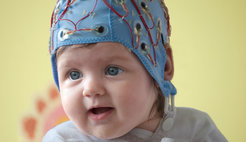Brain development shapes the acquisition of native sounds
The human brain is not fully developed at birth. Above all, it is still quite slow. Rapid brain activity, and thus the ability to process fast signals, only matures in the first years of life. In a study published in the journal Science Advances, researchers at the Max Planck Institute for Human Cognitive and Brain Sciences in Leipzig (MPI CBS) have shown for the first time that the slowness of the baby brain is crucial for the course of language acquisition.

Human language consists of a unique combination of sounds called phonemes. Phonemes distinguish meanings: In English, for example, the phoneme "th" distinguishes the word "three" from the word "tree". In German, on the other hand, this difference does not exist (the initial sounds of Tee and Thema sound the same). Babies are already able to recognise the phonemes of their mother tongue in the first year of life. This is remarkable, because phonemes in the speech signal are actually too short for the baby brain, which still operates based on slow brain waves. Katharina Menn and her colleagues at MPI CBS have now discovered how babies nevertheless manage to process even short sounds.
The scientists noticed that individual phonemes only last about 50 milliseconds. However, some features of speech sounds change much more slowly: several sounds often occur in succession that share a feature. For example, a whole word (e.g. "band") consists of voiced phonemes, i.e. those in which the glottis in the larynx vibrates. Could the slow baby brain be fast enough to detect and process such constant features of phonemes?
"In our study, we show that this seems to be exactly the case," explains Katharina Menn. "We used electroencephalography (EEG) measurements to track the early acquisition of phonemes in babies aged 3 months to 5 years. This is the first time we have used a novel method of analysis in children of this age, which allows us to detect the emergence of neural representations of native phonemes from the EEG recordings."
The results of the analyses show a gradual development of neural responses to the phonemes of the mother tongue within the first 5 years of life. A groundbreaking finding is that babies first acquire those phonological features that are present over several phonemes - which is consistent with the slow processing abilities of their brains. Shorter-lived phonetic features are gradually added, with the shortest features acquired last.
"Our results illustrate that the development of brain activity influences early language acquisition by determining the duration of units that can be acquired. The baby brain may be slow - but it is fast enough to enable entry into the mother tongue," Katharina Menn concludes. Her research offers new insights into the complex processes of early childhood language development and underlines the significant role that the development of brain activity plays in this process.












